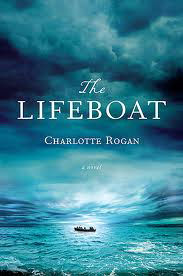|

Occasionally
a book settles into your mind and takes root. It could be the story. Or
the characters. Or the theme. But it becomes a novel that you ponder
long after the last page. The Lifeboat by Charlotte
Rogan—the April book club selection for She Reads—was such a novel:
Grace
Winter, 22, is both a newlywed and a widow. She is also on trial for
her life.
In
the summer of 1914, the elegant ocean liner carrying her and her
husband Henry across the Atlantic suffers a mysterious explosion.
Setting aside his own safety, Henry secures Grace a place in a
lifeboat, which the survivors quickly realize is over capacity. For any
to live, some must die.
As the castaways battle the elements, and each other, Grace recollects
the unorthodox way she and Henry met, and the new life of privilege she
thought she'd found. Will she pay any price to keep it?
The Lifeboat is a
page-turning novel of hard choices and survival, narrated by a woman as
unforgettable and complex as the events she describes.
I kept waking up in the middle
of the night, dreaming that I was aboard lifeboat 14 with Grace and the
other survivors of the ill-fated ship. And what’s worse, I dreamed that
my children were with me (one of the characters has a child aboard).
Placing myself in that scenario created all kinds of interesting
questions. What would I do to keep my children alive in the midst of
tragedy? How far should one go? Are there limits to
the survival instinct? How does faith play a role in the midst of
tragedy? Can one overlook providential circumstances and consider them
coincidence?
What made the story even more
fascinating is that the narrator is unreliable. She’s not all what she
seems to be and things may not have happened the way she recalls them.
All in all, The Lifeboat was a stunning novel that
I am unable to forget. And that is always the sign of brilliant
storytelling.
The Lifeboat
is Charlotte Rogan’s debut novel. She was gracious enough to answer a
few questions for me and I thought I’d share them here:
1. Grace Winter is a
survivor. Long before she ever sets foot on the doomed ocean liner,
Empress Alexandra, she is orchestrating the circumstances of her life.
She is complex and cunning, but would you go so far as to describe her
as an anti-hero? Or simply an unreliable narrator? Or neither?
Yes, Grace is unreliable, but
who is absolutely reliable, especially when her life or freedom is at
stake? But I guess any answer about an antihero depends on definitions.
She is intelligent and able to adapt, as well as seductive and somewhat
mysterious, so perhaps Grace would qualify.
But I wonder if the old
distinctions still apply. Fictional characters have become increasingly
complex, and there are very few contemporary adult novels that focus on
someone pure, noble, and true—or purely evil for that matter. For the
idea of heroes and villains and maybe even antiheroes to make sense, we
readers all have to agree on the larger social and moral context, and
it seems this sort of agreement is less likely than it was years ago.
Thus, a hero and a damsel in distress might have played well to a
certain kind of old-fashioned audience, but these days I think we would
want to know why the damsel needed rescuing in the first place and if
she mightn’t have been given some character traits that allowed her to
rescue herself.
2.
Throughout the novel Grace repeats the phrase, "God helps those who
help themselves." And even though she appears demure, she is anything
but passive. So much so that later in the novel, one of the women she's
on trial
|
with says to her, "You're not as weak as you appear." I can't
imagine that it was easy to create such a layered, fascinating
character. Can you describe your inspiration for Grace Winter, and how
you went about developing her character?
My
characters start out as
voices in my head. Often they are defending themselves against some
unseen authority or arguing some unwinnable point. Grace started out
alternately defending her actions in the boat and tormenting poor Mary
Ann.
In 1914, the options for women
were much more limited than they are today, but we still live in a
world when many decisions that affect only the female half of the
population are decided by men. You have only to read the news about the
birth control  debate or the problem of human
trafficking or the lack of third world educational opportunities for
girls to know that this is true. And the reason for this is that men
are more powerful than women—physically, of course, but also
politically, which maybe is just a derivative of strength. Grace was
not going to solve the disparities of biology and politics all by
herself, so she used what resources she had. debate or the problem of human
trafficking or the lack of third world educational opportunities for
girls to know that this is true. And the reason for this is that men
are more powerful than women—physically, of course, but also
politically, which maybe is just a derivative of strength. Grace was
not going to solve the disparities of biology and politics all by
herself, so she used what resources she had.
It continues to be true—we see
this in politics all the time—that women are criticized for actions
that would never be questioned in a man. I’m afraid the world still
wants women to be nice. Was Grace completely likable? Not at all. But I
wanted to write about a woman who didn’t meekly assume the role
assigned to her, who didn’t conform either to the expectations of the
other characters or to the expectations of the reader.
3. While reading THE
LIFEBOAT I found myself continually wondering what I would do in that
situation--especially if any (or all) of my children were with me. I
think the strength of your novel lies in its ability to make the reader
question how far they would go to stay alive. And I have to wonder, had
you been on Lifeboat 14, what would you have done? Would you have taken
sides in the power struggle between Mr. Hardie and Ursula Grant? Would
you--as some of your characters did--surrender yourself to the ocean?
Or would you have fought for life like Grace?
Want to see a tiger mom? Just
put me in a lifeboat situation with my children! Who knows what I would
have done—either with or without them?
Most people wouldn’t hesitate to
steer a runaway trolley away from a crowd and toward a single person,
thereby killing one to save many. But those same people are appalled at
the idea of pushing a fat man in front of the trolley even if that
action accomplishes the same result. The idea of laying hands on
another person is anathema to most of us—even if we are secretly
relieved when someone else does the dirty work for us.
I think one of the fascinating
things about the law is that through it we judge people for their
actions in circumstances we have never experienced. And the great thing
about fiction is that we can try these circumstances on and ask
ourselves: What would I do?


|